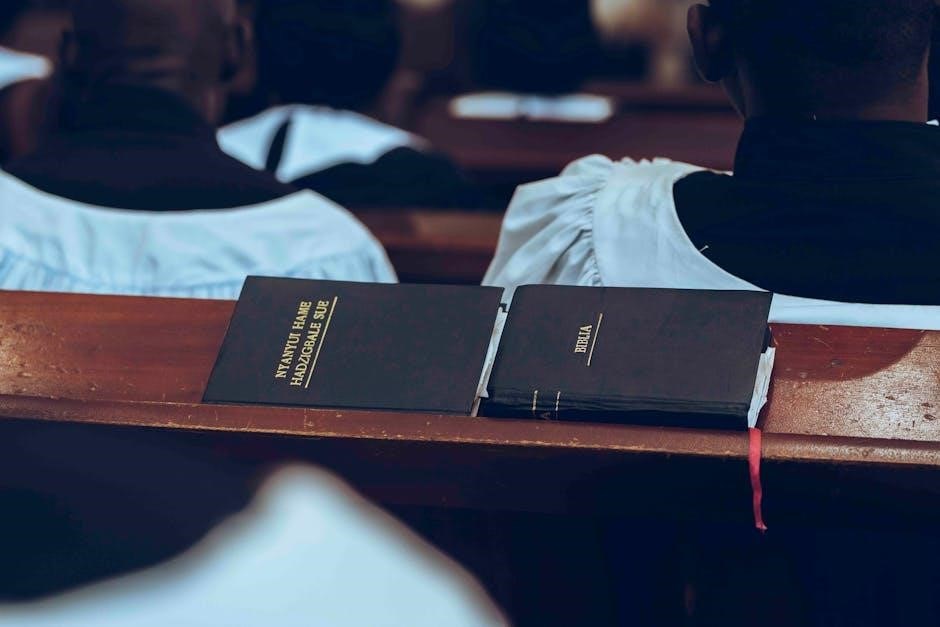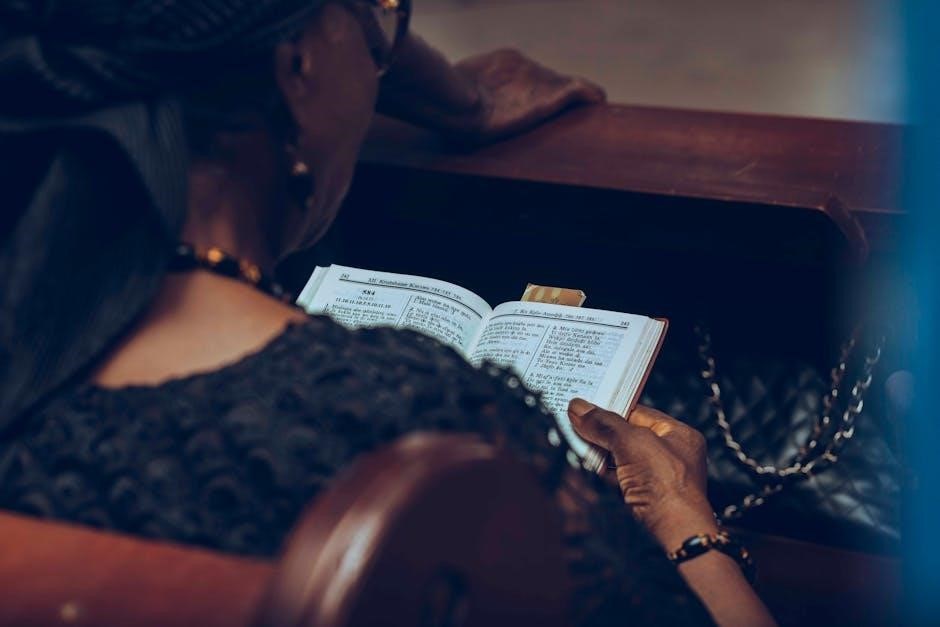The Book of Melchizedek, a mysterious and influential text, explores the enigmatic figure of Melchizedek, drawing from biblical and extra-biblical sources to reveal his significance in theology and priesthood.
1.1. Overview of the Book of Melchizedek
The Book of Melchizedek delves into the mysterious figure of Melchizedek, exploring his dual role as king and priest, and his significance in biblical and theological contexts. It examines his appearances in Genesis, Psalms, and Hebrews, highlighting his unique priesthood and its connection to Jesus Christ. The book also discusses practical applications for modern Christians, such as understanding Jesus’ dual role and the importance of tithing. Controversies surrounding Melchizedek’s identity and the eternal nature of his priesthood are explored, offering insights into his enduring theological impact.
1.2. Historical Context and Significance
Melchizedek’s historical significance emerges from his unique role as a king-priest in ancient Salem, predating the Levitical priesthood. His appearance in Genesis 14, lack of genealogy, and eternal priesthood highlight his mysterious and timeless figure. The Dead Sea Scrolls and Nag Hammadi texts further illuminate his influence, suggesting a broader religious impact. His priesthood, independent of lineage, contrasts with the Levitical system, symbolizing a divine order beyond human constraints, making him a pivotal figure in biblical and theological history.
1.3. The Enigmatic Figure of Melchizedek
Melchizedek remains one of the Bible’s most enigmatic figures, appearing briefly in Genesis 14 and Psalm 110. His role as both king and priest, without genealogy or lineage, has sparked debates about his identity. Some theories suggest he was a pre-incarnate Christ or Shem, Noah’s son, though neither is conclusive. His priesthood, described as eternal, contrasts with the Levitical order, making him a symbolic precursor to Jesus. This mystery has captivated scholars and theologians, adding depth to his significance in biblical and theological narratives.
The Biblical Mentions of Melchizedek
Melchizedek appears in Genesis, Psalms, and Hebrews, with key mentions in Genesis 14:18-20 and Psalm 110:4. His role as king and priest connects to Jesus in the New Testament.
2.1. Genesis 14:18-20 ⸺ The First Appearance
Melchizedek first appears in Genesis 14:18-20 as the king of Salem and priest of God Most High. He blesses Abram, offering bread and wine, symbolizing peace and divine connection. Abram gives him a tithe, acknowledging his priesthood. This passage highlights Melchizedek’s dual role as king and priest, with no mention of his lineage, suggesting an eternal priesthood. His appearance foreshadows Jesus’ role as king and high priest, emphasizing the significance of his ministry and the tithe as an act of faith and worship.
2.2. Psalm 110:4 ⸺ The Order of Melchizedek
Psalm 110:4 references Melchizedek, stating, “You are a priest forever, in the order of Melchizedek.” This verse, written by David, prophesies the Messiah’s priesthood. It highlights Melchizedek’s unique, eternal priesthood, distinct from the Levitical order. The phrase underscores the dual role of kingship and priesthood, later fulfilled in Jesus Christ. This passage is pivotal, linking Melchizedek’s ancient ministry to the redemptive work of Jesus, emphasizing the eternal nature of His priesthood and its theological significance in both Old and New Testaments.
2.3. Hebrews 5-7 ⸺ The Priesthood of Melchizedek
Hebrews 5-7 delves into Melchizedek’s priesthood, contrasting it with the Levitical system. The author emphasizes that Melchizedek, without genealogy or death, remains a priest eternally. Christ’s priesthood, superior to Aaron’s, follows this order, fulfilling Psalm 110:4. This eternal priesthood offers a once-for-all sacrifice, replacing the recurring Levitical sacrifices. The passages highlight Melchizedek’s unique role, foreshadowing Christ’s dual ministry as king and priest, and the superiority of the new covenant through His sacrifice, providing eternal redemption and direct access to God for believers.

The Role of Melchizedek in the Bible
Melchizedek, as king and priest, blessed Abram, receiving a tithe and symbolizing divine authority. His dual role prefigured Christ’s ministry, emphasizing unity in kingship and priesthood.
3.1. King and Priest ⸺ Dual Roles
Melchizedek’s dual role as king of Salem and priest of God Most High is unique, blending governance and spirituality. This duality symbolizes divine authority and harmony, foreshadowing Christ’s role as both king and high priest, where governance and salvation are unified. His priesthood, independent of lineage, emphasizes divine appointment, while his kingship represents peace and righteousness. This blend underscores the eternal nature of his ministry, transcending traditional priestly orders and pointing to a higher, eternal priesthood fulfilled in Jesus Christ.
3.2. The Tithe Given by Abraham
Abraham’s tithe to Melchizedek signifies a profound act of faith and recognition of divine authority. After his victory, Abraham gave Melchizedek a tenth of the spoils, acknowledging God’s sovereignty and Melchizedek’s priestly role. This act, recorded in Genesis 14:20, symbolizes submission to God’s will and the establishment of a spiritual covenant. The tithe also represents Abraham’s gratitude for Melchizedek’s blessing and the divine deliverance he received. This gesture is later used in Hebrews to highlight the superiority of Melchizedek’s priesthood over the Levitical system.
3.3. The Blessing of Abram by Melchizedek
Melchizedek’s blessing of Abram is a pivotal moment in Genesis 14:19-20, where he declares, “Blessed be Abram of God Most High.” This blessing underscores Melchizedek’s priestly authority and divine connection. It highlights Abram’s role as a recipient of God’s favor and sets a precedent for future interactions between God and His people. The blessing also emphasizes Melchizedek’s unique position as both king and priest, making him a significant figure in biblical theology and a foreshadowing of Christ’s dual role as king and high priest.

Theological Significance of Melchizedek
Melchizedek’s dual role as king and priest symbolizes Christ’s ministry, emphasizing eternal priesthood and divine order. His enigmatic presence underscores God’s redemptive plan and eternal covenant with humanity.
4;1. Foreshadowing of Jesus Christ
Melchizedek’s role as both king and priest prefigures Jesus’ dual ministry. His eternal priesthood, without beginning or end, mirrors Christ’s perpetual intercession. The offering of bread and wine by Melchizedek also symbolizes the Eucharist, linking it to Christ’s sacrifice. This connection is emphasized in Hebrews, where Jesus is identified as a high priest after the order of Melchizedek, highlighting His divine and eternal nature. Thus, Melchizedek serves as a typological precursor to Jesus, illustrating God’s redemptive plan across time.
4.2. The Eternal Priesthood
Melchizedek’s priesthood is described as eternal, without beginning or end, emphasizing its divine and perpetual nature. Unlike the Levitical priesthood, which was tied to genealogy and human limitations, Melchizedek’s role transcends time and mortality. This eternal aspect of his priesthood is central to its theological significance, as it prefigures the eternal intercession of Jesus Christ. The absence of a recorded lineage for Melchizedek further underscores the supernatural and enduring character of his priesthood, making it a unique and timeless model of spiritual leadership.
4.3. The Transition from Levitical to Melchizedek Priesthood
The transition from the Levitical priesthood to that of Melchizedek signifies a shift from a system bound by human limitations to one characterized by eternity and divine appointment. The Levitical order, based on lineage and temporary sacrifices, was insufficient to achieve eternal redemption. In contrast, Melchizedek’s priesthood, being eternal and without genealogical constraints, foreshadows the ultimate priesthood of Jesus Christ. This transition highlights the superiority of the Melchizedek order, emphasizing Christ’s role as the perfect, eternal High Priest who offers a once-for-all sacrifice for humanity’s redemption.

Extra-Biblical References to Melchizedek
Extra-biblical texts, like the Nag Hammadi Library and Dead Sea Scrolls, offer insights into Melchizedek’s role, enhancing his theological significance beyond biblical accounts.
5.1. The Nag Hammadi Library
The Nag Hammadi Library, a collection of Gnostic texts, includes the Book of Melchizedek, which portrays him as a divine being with a unique priesthood. This text describes Melchizedek as a preexistent, heavenly figure, emphasizing his role as a precursor to Jesus Christ. It highlights his eternal priesthood and universal salvation message, offering insights into his theological significance beyond biblical accounts.
5.2. The Dead Sea Scrolls
The Dead Sea Scrolls, particularly the fragment 11Q13, provide intriguing insights into Melchizedek’s role. This text portrays him as a divine, preexistent being tasked with judging the wicked and redeeming the righteous. It aligns his priesthood with eternal salvation, suggesting a messianic figure. The scrolls emphasize Melchizedek’s role in eschatological events, further connecting him to Jesus Christ as a high priest and savior. These writings enrich the theological understanding of Melchizedek beyond biblical references.
5.3. Other Ancient Texts
Beyond the Dead Sea Scrolls, other ancient texts like the Nag Hammadi Library and Gnostic writings shed light on Melchizedek’s divine role. The Second Book of Enoch describes him as a celestial being who ascends to heaven without death. Some texts portray him as a preexistent savior figure, emphasizing his eternal priesthood. These writings connect Melchizedek to Jesus, highlighting their shared roles as king and priest. Such texts, though not canonical, provide rich theological insights into Melchizedek’s significance in early religious thought and his enduring symbolic importance.
The Symbolism of Melchizedek
Melchizedek symbolizes peace, priesthood, and divine order, embodying kingship and spiritual authority. His offering of bread and wine prefigures Christ’s Eucharistic sacrifice, linking him to eternal priesthood and redemption.
6.1. The King of Salem (Peace)
Melchizedek, as the King of Salem, embodies the essence of peace and righteousness. Salem, meaning “peace,” signifies his role as a ruler who brings harmony and prosperity. His kingship is not merely earthly but divine, reflecting God’s order. This title underscores his dual role as both a king and a priest, emphasizing his unique position in mediating between the earthly and heavenly realms. The peace he represents is eternal, foreshadowing the ultimate peace brought by Jesus Christ.
6.2. The Priest of God Most High
Melchizedek’s role as the Priest of God Most High signifies his divine authority to mediate between God and humanity. His priesthood, described in Genesis 14 and Hebrews 7, is unique, lacking a genealogical lineage, making it eternal. He blessed Abraham and received a tithe, symbolizing recognition of his priestly authority. This priesthood foreshadows Christ’s eternal role as High Priest, emphasizing direct access to God without earthly intermediaries. Melchizedek’s priesthood represents a higher, timeless order of worship and sacrifice.
6.3. The Bread and Wine Offering
Melchizedek’s offering of bread and wine to Abraham holds profound symbolic meaning. It prefigures the Eucharistic elements used by Christ at the Last Supper, establishing a connection between Melchizedek’s priesthood and Christ’s sacrificial act. This gesture symbolizes peace, thanksgiving, and spiritual nourishment, reflecting Melchizedek’s role as a priest-king who brings harmony and divine blessings. The simplicity of the offering underscores the enduring power of faith and the eternal priesthood, bridging ancient traditions with future redemptive acts.

Melchizedek in the New Testament
Melchizedek’s significance is highlighted in the New Testament, particularly in Hebrews, where he is linked to Jesus Christ, emphasizing his eternal priesthood and divine role.
7.1. The Connection to Jesus Christ
The New Testament, particularly the Book of Hebrews, establishes Melchizedek as a prefiguration of Jesus Christ. His role as both king and priest foreshadows Christ’s dual ministry, while his eternal priesthood underscores the superiority of Christ’s sacrifice. In Hebrews 5-7, Melchizedek’s priesthood is contrasted with the Levitical order, highlighting its timeless nature. This connection emphasizes Christ’s role as the ultimate High Priest, offering a single, sufficient sacrifice for humanity. Thus, Melchizedek’s ministry serves as a theological bridge, illustrating Christ’s eternal and redemptive work.
7.2. The Role in the Book of Hebrews
The Book of Hebrews extensively explores Melchizedek’s priesthood, using it to illustrate the superiority of Christ’s ministry. In chapters 5-7, Melchizedek is portrayed as a priest without genealogy, emphasizing the eternal nature of his order. This contrasts with the Levitical priesthood, which was based on lineage and limited by time. By comparing Christ to Melchizedek, the author of Hebrews underscores the permanence and preeminence of Christ’s priesthood, highlighting His role as the ultimate High Priest who offers a once-for-all sacrifice, securing eternal redemption for believers.
7.3. The Eternal Nature of His Priesthood
Melchizedek’s priesthood is described in Hebrews as eternal, without beginning or end, symbolizing a divine order beyond human limitations. Unlike the Levitical priesthood, which relied on lineage and duration, Melchizedek’s role transcends time, emphasizing its spiritual and perpetual significance. This eternal aspect underscores the theological connection to Jesus Christ, who, as the ultimate High Priest, embodies the same timeless and superior priesthood, offering a once-for-all sacrifice for humanity’s redemption. This concept is central to understanding the theological depth of Melchizedek’s ministry and its enduring relevance in Christian doctrine.

Practical Applications for Modern Christians
Melchizedek’s dual role as king and priest inspires modern Christians to embrace spiritual leadership and service. His example of giving and blessing others encourages gratitude and generosity in daily life.
8.1. Understanding Jesus’ Dual Role
Melchizedek’s dual role as king and priest foreshadows Jesus’ ministry, emphasizing His authority and intercession. Jesus, like Melchizedek, unites kingship and priesthood, offering eternal salvation and direct access to God. This unique duality, explored in Hebrews 7, highlights Jesus’ superiority over the Levitical system, providing a once-for-all sacrifice. Modern Christians can draw strength from Jesus’ eternal priesthood, knowing He reigns as King and intercedes as Priest, embodying both governance and grace. This understanding deepens devotion and trust in His redemptive work and ongoing advocacy.
8.2. The Significance of the Tithe Today
The tithe, exemplified by Abraham’s offering to Melchizedek, remains a vital spiritual practice. It symbolizes trust in God’s provision and acknowledges His sovereignty over all resources. Today, tithing reflects obedience, gratitude, and partnership in God’s work. While the Old Testament required a tenth, modern tithing encourages a generous, cheerful response, supporting ministries and communities. Practicing the tithe fosters faith, accountability, and a deeper connection to God’s kingdom, bridging ancient tradition with contemporary worship and stewardship.
8.3. Lessons from Melchizedek’s Ministry
Melchizedek’s ministry offers profound lessons for modern Christians. His dual role as king and priest highlights the unity of spiritual and earthly authority. The bread and wine he offered symbolize communion and fellowship with God. His priesthood, untouched by lineage or time, exemplifies eternal divine service. Melchizedek’s blessing of Abraham underscores God’s sovereignty and grace. These elements remind us of the enduring nature of faith, the importance of spiritual leadership, and the timeless connection between worship and service, inspiring believers to embrace a holistic life of devotion and stewardship.

Controversies and Debates
Melchizedek’s identity and priesthood spark debates among scholars, with discussions ranging from his divine nature to his role as a prefiguration of Christ, challenging traditional theological views.
9.1. The Identity of Melchizedek
Melchizedek’s identity remains a subject of debate, with theories ranging from a pre-incarnate Christ to Shem, Noah’s son. His absence of genealogy in Hebrews suggests an eternal priesthood, distinct from the Levitical order. Some scholars argue his dual role as king and priest symbolizes Christ’s future ministry, while others see him as a unique, divinely appointed figure. This enigmatic character has sparked theological discussions, emphasizing his significance in foreshadowing Jesus’ priesthood and the transition from the Old to the New Covenant.
9.2. The Eternal Nature of His Priesthood
Melchizedek’s priesthood is described as eternal in Hebrews 7, emphasizing its timeless and unchanging nature. Unlike the Levitical priesthood, which was tied to lineage and mortality, Melchizedek’s role is based on an indestructible life and a divine oath. This eternal aspect underscores his unique position as a priest “forever” and serves as a foreshadowing of Christ’s priesthood, which similarly transcends human limitations. The theological significance lies in its representation of an unbroken, divine order that surpasses earthly systems, highlighting God’s enduring plan of salvation through Jesus Christ.
9.3. The Role of Melchizedek in Modern Theology
Melchizedek’s role in modern theology centers on his symbolic representation of Christ’s dual role as king and priest. His eternal priesthood is seen as a precursor to Christ’s high priesthood, offering a unified understanding of divine authority and redemption. This perspective enriches contemporary theological discussions, emphasizing the continuity of God’s plan across scripture. Melchizedek’s enigmatic nature fosters deeper exploration into the nature of priesthood, grace, and the atonement, resonating with modern Christians seeking a richer understanding of Christ’s mission and their spiritual identity in Him.
The Legacy of Melchizedek
Melchizedek’s legacy endures as a symbol of divine priesthood and peace, influencing both Jewish and Christian thought. His enigmatic figure continues to inspire theological reflection and spiritual exploration.
10.1. Influence on Jewish and Christian Thought
Melchizedek’s dual role as king and priest has profoundly shaped Jewish and Christian theology. In Jewish tradition, his enigmatic presence sparks debates, with some linking him to Shem, while others see him as a prototype of the Messiah. For Christians, Melchizedek symbolizes the eternal priesthood, prefiguring Jesus’ dual role as king and high priest. This duality emphasized in Hebrews underscores the superiority of Christ’s priesthood over the Levitical order, offering a timeless theological framework for understanding redemption and divine intercession.
10.2. The Enduring Symbolism
Melchizedek’s portrayal as king and priest embodies enduring symbolism, particularly in his offering of bread and wine, which prefigures the Eucharist. His title as “King of Salem” (peace) and “Priest of God Most High” underscores themes of harmony and divine connection. The absence of genealogy in Hebrews highlights his eternal priesthood, a symbol of timeless spiritual authority. These elements transcend time, resonating deeply in religious thought and inspiring reflection on divine order and redemption, making Melchizedek a timeless, universal figure.
10.3. The Future Implications
Melchizedek’s legacy offers profound future implications for theology and spirituality. His eternal priesthood symbolizes a transcendent divine order, inspiring deeper exploration of Jesus’ dual role as king and priest. The mystery surrounding Melchizedek’s origins encourages ongoing scholarly inquiry, while his unique priesthood challenges traditional religious structures. As a bridge between ancient and eternal, Melchizedek’s story continues to illuminate paths for modern faith, emphasizing unity, peace, and the timeless nature of divine priesthood, ensuring his relevance in future religious and philosophical discourse.
The Book of Melchizedek in Modern Literature
The Book of Melchizedek is explored in modern literature through scholarly works, popular books, and digital resources, offering fresh insights into his enigmatic role and timeless significance.
11.1. Scholarly Works
Scholarly works on the Book of Melchizedek contribute significantly to a deeper understanding of his enigmatic figure and theological implications. These works often include fresh research, examining his historical context, biblical references, and extra-biblical mentions. Scholars explore themes such as his dual role as king and priest, the eternal priesthood, and his connection to Jesus Christ. Books like The Priesthood of Melchizedek and Melchizedek and the Temple offer detailed analyses, linking his story to broader theological frameworks. Authors like James Tabor and John Welch provide insightful perspectives, making these works invaluable for academic and religious inquiry.
11.2. Popular Books
Popular books on the Book of Melchizedek cater to a broader audience, blending historical insights with spiritual themes. Titles like Melchizedek: The Mystery of the King-Priest and The Melchizedek Factor explore his enigmatic figure, offering accessible interpretations of his biblical role. These books often delve into symbolic meanings, such as his bread and wine offering, and their connection to Christian sacraments. Authors like Jordan Maxwell and E. Raymond Capt provide engaging narratives, making the subject relatable for readers seeking spiritual growth and historical understanding. These works are ideal for those exploring Melchizedek’s legacy beyond academic circles.
11.3. Digital Resources
Digital resources offer accessible insights into the Book of Melchizedek, with PDFs and online articles widely available. Websites like Christianity.com and academic databases provide detailed analyses of his biblical significance. The Nag Hammadi Library and Dead Sea Scrolls are digitized, offering ancient texts that reference Melchizedek. Online forums and e-books explore his symbolic roles and theological implications. These resources cater to both researchers and casual readers, making in-depth study of Melchizedek more convenient than ever. They bridge tradition and modernity, ensuring his legacy remains accessible.
The Book of Melchizedek offers profound theological insights, bridging ancient traditions and modern understanding. Its exploration of Melchizedek’s dual role as king and priest highlights his enduring legacy.
12.1. Summary of Key Points
The Book of Melchizedek delves into the enigmatic figure of Melchizedek, exploring his dual role as king and priest, his eternal priesthood, and his connection to Jesus Christ. It highlights his significance in biblical theology, emphasizing his role as a foreshadowing of Christ and the transition from the Levitical to the Melchizedek priesthood. The book also examines extra-biblical references, such as the Nag Hammadi Library and Dead Sea Scrolls, offering a comprehensive understanding of his legacy. Practical applications for modern Christians include insights into Jesus’ dual role, the tithe, and lessons from Melchizedek’s ministry.
12.2. Final Thoughts
Melchizedek remains a profound and enigmatic figure, bridging the Old and New Testaments. His dual role as king and priest, along with his eternal priesthood, underscores his significance in biblical theology. As a precursor to Jesus Christ, Melchizedek’s story invites deeper reflection on Christ’s roles as king and high priest. His legacy challenges modern Christians to embrace the timeless truths of faith, sacrifice, and divine order. The study of Melchizedek encourages a richer understanding of God’s plan and the interconnectedness of Scripture.
12.3. Encouragement to Further Study
Exploring the Book of Melchizedek offers profound insights into biblical theology and the connection between the Old and New Testaments. Readers are encouraged to delve into scholarly works, digital resources, and ancient texts to uncover the richness of Melchizedek’s legacy. By examining his role as a priest, king, and precursor to Jesus Christ, one gains a deeper understanding of God’s eternal plan. Engaging with these materials can enhance spiritual growth and provide a fuller appreciation of the biblical narrative, inspiring a lifelong journey of discovery and faith.
